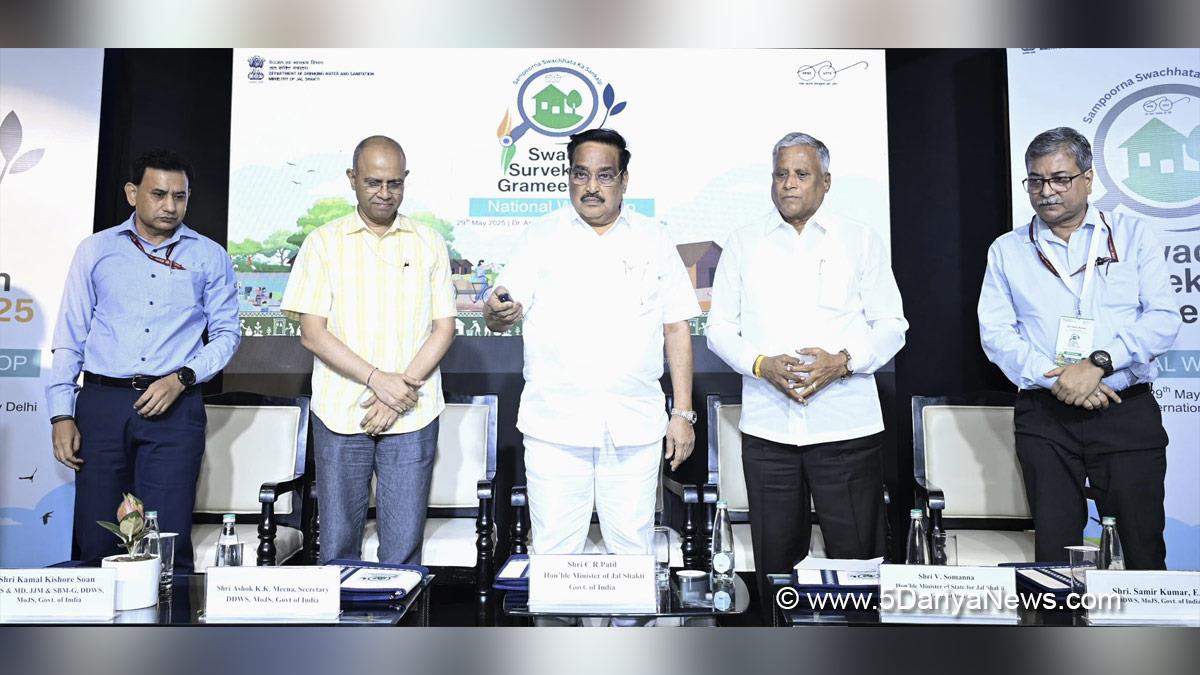C R Paatil launches India’s largest sanitation survey- SSG 2025 in Delhi

Union Minister of Jal Shakti Shri C R Paatil launched Swachh Survekshan Grameen (SSG) 2025, a nationwide rural sanitation survey by the Department of Drinking Water and Sanitation (DDWS), Ministry of Jal Shakti today in Delhi in the presence of Minister of State of Jal Shakti Shri V. Somanna.
The senior government representatives including Secretary, DDWS Shri Ashok KK Meena, Additional Secretary & Mission Director, Shri Kamal Kishore Soan, State Secretaries and Mission Directors were also present at the event.
Speaking at the event, the Union Minister, Shri C R Patil, reiterated the importance of “measuring to manage”, a principle that underpins the impact of flagship programmes. He urged all States/ UTs to continue sharing their innovations and best practices, and the Minister noted that Swachhata is not a one-time goal but a continuous journey.
As we work towards a Viksit Bharat, sanitation must remain a sustained, people-led effort powered by true Jan Bhagidari. Minister of State of Jal Shakti, and Railways, Shri V. Somanna, said SSG is not merely a survey, but a national validation exercise, and a powerful tool to rank states and districts on their rural sanitation performance.
He reminded everyone ‘our villages are the soul of India’ and making them ODF Plus Model should be seen as a lived and visible reality. Secretary, DDWS, Shri Ashok KK Meena, shared that SSG 2025 is anchored in SBM-G Phase 2 and to ensure the success of this massive endeavor, States and UTs must ensure accurate and timely IMIS reporting, mobilize grassroots networks like District Training Management Units and Swachhagrahis for capacity building, and deploy trained staff across all levels.
SSG 2025 aims to rigorously assess the on-ground status of rural sanitation, with a sharp focus on sustaining the Open Defecation Free (ODF) Plus Model outcomes achieved under SBM-G. The overarching objective of SSG-2025 is to provide a national ranking of all States/UTs and Districts of India based on quantitative and qualitative sanitation parameters as identified under SBM-II.
DDWS has engaged an independent agency which will carry out the survey using a structured assessment framework aligned with SBM-G Phase II guidelines. SSG-2025 will help ascertain the progress of SBM-G through a sampled village assessment, surveying households (HH) and public places in villages to assess their status on various cleanliness parameters including functionality of Plastic Waste Management Units (PWMU), Faecal Sludge Management(FSM) plants, GOBARdhan Plant, citizen feedback and Swachhata Green Leaf Rating (SGLR) sites.
A structured approach shall be followed to evaluate the status of States/UTs and Districts on key performance outcomes of SBM Phase-II and they will be ranked across four key components:
Service-Level Progress (SLP), based on data from district self-assessment reports and desktop verification of ODF Plus Model Verified villages
Direct Observation of Sanitation Status of Villages, through field-based observation in sampled villages, households and public places including schools, CSCs etc.
Direct Observation of Functionality of Sanitation Infrastructure, such as Plastic Waste Management Units, GOBARdhan plants, and Faecal Sludge Management systems
SSG 2025 Citizen Feedback, gathered via a mobile application and one-on-one interactions during the field survey
These elements shall be grouped into sub-components to derive a composite score, ensuring a transparent, technology-driven, and community-led assessment process. To uphold the data integrity, geo-fencing feature has been introduced in the Survey and further, to promote public engagement, a dedicated mobile app has been created to gather the citizen feedback.
Swachh Survekshan Grameen 2025 marks a pivotal step in reinforcing India’s commitment to clean, healthy, and sustainable rural communities. In the months ahead, the collective efforts of Panchayats, local leaders, frontline workers, and citizens will shape the sanitation narrative of rural India, taking the Nation closer to its goal of a Swachh Bharat.
The event witnessed the launch of the Assessment Framework of Swachh Survekshan Grameen 2025 and a compendium of State Best practices, Swachhata Chronicles Volume III.

Comments are closed.